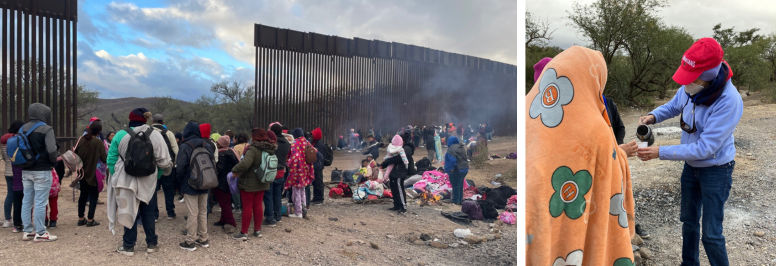“When a society – whether local, national or global – is willing to leave a part of itself on the fringes, no political programs or resources spent on law enforcement or surveillance systems can indefinitely guarantee tranquility.” – Pope Francis, Evangelii Gaudium # 59
I have had the privilege of being part of a humanitarian team traveling to the Border Wall south of Tucson and East of Sasabe. I am writing to bear witness to what I have experienced and to set that within the context of the Catholic Church’s Social Doctrine.
First of all, the Wall is not complete and it will never be complete. Even though 458 additional miles of the 30-foot-high wall were constructed under the Trump Administration, there are places where even the resources of the United States cannot overcome geography. And then there is weather. On the U.S. side, the footing of the wall can be maintained by the crews that keep the road along the wall passible. But there are no road crews on the Mexican side, so there are places where the runoff from frequent flash floods undermines the Wall and it falls over.
Organized crime or cartels operate within Mexico with impunity. These are the people who charge the people who want to cross thousands of dollars to be transported to an opening in the Wall. I have heard $6,000 per person. I have been told that if an opening is not available, that they can create one with tools that you could purchase at your local big box hardware store.
Who is coming? The asylum seekers are coming from over 20 different countries. Perhaps half come from Mexico and Central America. Large numbers of people also come from Africa. Men, women, children - they all come. They all want one thing – a better life. They are willing to risk everything for that.
Now, what I have experienced.
On a cold December morning, I was part of a team of four who arrived at a point along the Wall, about 10 miles East of Sasabe, around 7:30 am. A large group of Spanish speaking asylum seekers had arrived over night and built fires to try to stay warm. They were waiting for Border Patrol to pick them up. Border Patrol was aware that they were there and, in fact, had already transported some of the most vulnerable mothers with small children. The agent informed us that it was raining in Sasabe and she thought the people were better off waiting where they were, since the rain hadn’t started there yet.
We began to distribute hot tea, food and bottled water. We were lucky to have a nurse with us who did some initial medical screening and gave out over-the-counter meds to some of the children. We also distributed emergency metallic blankets. We had some mini teddy bears which we gave to the children. Then it started to rain. The asylum seekers gathered in small groups, huddled together and protected by the emergency blankets.
After about an hour, the rain lessened, and another group of about 100 people were brought to the Mexican side of the Wall by the cartel. I almost cried when I saw some of them kneel and kiss the ground as they reached the US side. Most of the people in this group were from Africa. Many of them spoke French, but none of us did, so we had to find an English-French bilingual migrant who would translate. We still had enough supplies to distribute food and water.
Never, in all this time, when the four of us were surrounded by a few hundred asylum seekers did we feel that anyone was a threat to us. Every person was filled with gratitude for the small tokens of welcome that we could give them. I was moved by the realization that we are all one human family, all children of the same God.
As Pope Francis pointed out in the quotation above, as long as there are countries where the conditions of the people are so impoverished and they are oppressed physically and politically, there are going to be people who will sell everything they have and even risk their lives to have a better life. And the efforts of the United States are going to be insufficient to keep them out.
The immigration system of the United States is broken. It has been broken ever since it was devised, and perhaps it has become more dysfunctional in this century than ever before. Our system is expensive (estimated to have cost between $21 billion and $70 billion), ineffective (one million people crossed last year) and unjust. Our immigration system never addresses the causes of unauthorized immigration, which is the terrible gap between the wealth we enjoy and the poverty and violence of the countries they are fleeing.
In our Scriptures, God tells us 46 times to welcome the alien, the stranger. We hear it again from Jesus in Matthew’s Gospel. Let us take this to heart.
Jeanette Arnquist is a former Director of the Department of Life, Dignity & Justice for the Diocese of San Bernardino. She is retired and living in Tucson, Arizona where she remae in social concerns ministries.


